Kenneth Atchity's Blog, page 119
May 16, 2018
The Meg – Exclusive Image From Jason Statham’s Giant Shark Movie

When Bruce first swam into Amity Island for a small bite to eat, it took Chief Brody and co. several days to track the toothy bastard down. What they could have done with is a precision shark-fighting tool: Jason Statham.
Thankfully the Stath is on board to battle another aquatic apex predator for this year’s popcorniest popcorn film. Cinema’s premiere brawny action star is going face-to-face with a gigantic Megalodon (that’s a huge prehistoric shark to you and me) in The Meg — and it could prove the summer’s most exciting showdown. “I mean, who doesn’t want to watch a movie about the biggest shark that’s ever existed? And I get to be in it? This is as good as it gets,” Statham told Empire.
We’ve got a brand new shot of the titular 'don, as seen in the new Summer Movie Blowout issue of Empire which hits shelves later this week.

Published on May 16, 2018 00:00
May 15, 2018
Head of Zeus Shout Out to MEG!
Published on May 15, 2018 00:00
May 12, 2018
3 Things Every Great Story Has To Have by Dr. Ken Atchity

Film Courage: What three things does a great story have to have?
Dr. Ken Atchity, Author, Publisher, Producer: What three things? Well, it has to have a hook that gets people instantly involved in the story and that’s a huge part of the story itself. And it’s got to have a very strong character in the story that you care about and other than that, it has to have twists and turns that lead to a surprise ending. If I had to just say three things, I guess that’s what I would say the three things are. Every story needs that because a story about nothing is not going to hold anyone’s interest.
And sometimes writers when they begin their careers think that if they just write, they can write about anything but the truth is they need to write from their heart about things that matter to everyone and if they do that, you can hardly go wrong. Because stories are really not about words or word choice or anything like that. They’re about conveying the power of a character facing a dilemma that you have no idea how he or she will resolve and when you do that you’ve got everyone’s attention.
And in ancient times there was a thing called The Oral Tradition which I used to teach as a professor of Homeric Greek. The Iliad and the Odyssey were sung at campfires and everyone in the culture knew the stories. We are publishing a book right now on Homeric song and how it worked and how it held culture together. And my first book those…I call those stories the shield of memory and it was because of those stories that a person knew how to deal with himself in battle or when facing an attacking boar or when facing an angry wife or when facing pillagers trying to burn down his village. He would instantly think of the story of Heracles who did this or that or the story of Aegean who did this and that and that’s all they had. They didn’t have books for learning. It was all passed along through the oral tradition. And I think stories have never failed to play that role in human life and when you think about it you know “What’s your story?” is probably the most human response to any encounter and it goes from the court of law where the jury is trying to decide which of the two stories do they believe, to a political campaign where the voters are making that decision, to a first date where you are going “Do I believe his story? I just don’t believe it? I can’t buy his story?” That’s the ultimate human turn down, you can’t buy the story. And it goes through everything. Advertising is conveying stories that people will want to buy the product. This is how humans operate on a daily basis so to me it’s absolutely amazing that an industry has been created where people will pay millions of dollars for stories and where stories can basically conquer the world and I believe unite the world.
I mean look at all the work we are now doing with China in the movie business. I just saw Lara Croft in Tomb Raider (the new version of it) where the male lead is Chinese and she is Western and clearly as a producer I’m watching it going “This was a Chinese financed movie,” because I understand how it works for the market…(Watch the video interview on Youtube here ).

Published on May 12, 2018 00:00
May 10, 2018
REVIEW: Dog Training the American Male by Steve Alten


Dog Training the American Male is a humorous fictional tale about a Doctor. Her profession as a counselor is going well but, her own personal life is not. Once Jacob Cope, another dashing character comes into play, things change. The two have to blend their families together passing through all the fluffy parts of the initial stage, move in together and make things work with the additional new dog.
The plot and storyline seemed very simple. There wasn’t anything novel about it. What made it enjoyable to read was the way it was told and the writing skills Steve Alten demonstrated in his book. The New York Times best-selling author did not shy away from making you laugh and ponder on certain aspects of the story.
The content was suitable for a more mature audience and the humor suited the situation built from the storyline. I particularly enjoyed Jacob’s personality and his behavior before and after meeting the protagonist.
The big sloppy German Shepherd was a nice addition bringing all of the elements of the story together. The love of an animal was a beautiful and insightful way to validate how animals do, in fact, influence us and affect us.
I recommend this book to anyone seeking a good fun read. There is nothing more delightful than reading a book like this, on a day when you really don’t feel like doing anything.
Written by Jeyran Main

Published on May 10, 2018 00:00
May 9, 2018
A Meeting of Holy Men... From Oscar Wilde by Richard Ellmann.
I was Richard Ellmann’s assistant at Yale. I actually remember reading this years after, and I adore Oscar Wilde. He it is who said, “Education is an admirable thing, but it is well to remember from time to time that nothing worth learning can be taught.” I put that on the top of every syllabus I created in my 17 years of teaching.
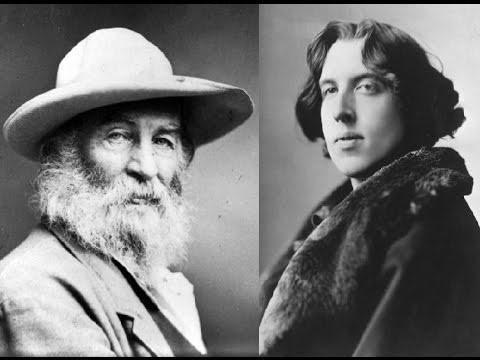
When young Oscar Wilde, the controversial Irish poet, playwright and novelist, visited Philadelphia in 1882 to lecture, he made a special point of visiting the much older poet Walt Whitman at his simple residence in nearby Camden, New Jersey. It was on this American lecture tour that Wilde first gained a wide degree of fame:
"Wilde's next lecture was scheduled for the Horticultural Hall in Philadelphia on 17 January. But he had another errand to carry out first. When he arrived at the Aldine Hotel in that city on the 16th, he was asked by a new batch of reporters which American poet he most admired. He replied without hesitation, 'I think that Walt Whitman and Emerson have given the world more than anyone else.' Longfellow, admirable as he was, was too close to European sources to have much effect in Europe. Wilde actually valued Poe, 'this marvellous lord of rhythmic expression,' above the others, but Poe was dead. 'I do so hope to meet Mr Whitman,' Wilde confided. 'Perhaps he is not widely read in England, but England never appreciates a poet until he is dead. There is something so Greek and sane about his poetry, it is so universal, so comprehensive. It has all the pantheism of Goethe and Schiller.' Two of his friends, J. M. Stoddart and George W. Childs, both publishers, were planning parties in Philadelphia for Wilde, and both invited Whitman to come from Camden, New Jersey, and attend them. Whitman declined both invitations, but asked Mrs Childs to give Wilde 'my hearty salutations and American welcome.' On 18 January, however, perhaps after reading Wilde's encomium in the press, he sent Stoddart a card, 'Walt Whitman will be in from 2 till 3 1/2 this afternoon, and will be most happy to see Mr. Wilde and Mr. Stoddart.' ...
"They drove companionably (across the Delaware River) to Camden (Wilde Londonized it later to Camden Town). At this time Whitman was living with his brother and sister-in-law. ... Wilde initiated the conversation by saying, 'I come as a poet to call upon a poet.' Whitman replied, 'Go ahead.' Wilde went on, 'I have come to you as one with whom I have been acquainted almost from the cradle.' He explained that his mother had purchased a copy of Leaves of Grass when it was published; presumably this was in 1868 (Wilde put it two years earlier), when William Michael Rossetti edited a selection of Whitman's poems. Lady Wilde read out the poems to her son, and later, when Wilde had gone up to Oxford, he and his friends carried Leaves of Grass to read on their walks....
"[After they drank a bottle of home made elderberry wine], Whitman proposed that they go to his den, where they could be on what he called 'thee and thou terms.' ...
"After two hours of talk Whitman said, 'Oscar, you must be thirsty. I'll make you some punch.' 'Yes, I am thirsty.' Whitman made him a 'big glass of milk punch,' Wilde 'tossed it off and away he went,' as Whitman recalled afterwards. But as he departed the old poet called out after him, 'Goodbye, Oscar, God bless you.' On the ride back to Philadelphia with Stoddart, who had played silent partner in these eager confabulations, Wilde unwontedly kept still, full of emotion at what he called 'the grand old man.' Stoddart, to lighten his mood, remarked that the elderberry wine must have been hard to get down. Wilde brooked no such criticism: 'If it had been vinegar I should have drunk it all the same, for I have an admiration for that man which I can hardly express.' The next time he was interviewed by a reporter, he said of Whitman, 'He is the grandest man I have ever seen, the simplest, most natural, and strongest character I have ever met in my life. I regard him as one of those wonderful, large, entire men who might have lived in any age and is not peculiar to any people. Strong, true, and perfectly sane: the closest approach to the Greek we have yet had in modern times.' "


When young Oscar Wilde, the controversial Irish poet, playwright and novelist, visited Philadelphia in 1882 to lecture, he made a special point of visiting the much older poet Walt Whitman at his simple residence in nearby Camden, New Jersey. It was on this American lecture tour that Wilde first gained a wide degree of fame:
"Wilde's next lecture was scheduled for the Horticultural Hall in Philadelphia on 17 January. But he had another errand to carry out first. When he arrived at the Aldine Hotel in that city on the 16th, he was asked by a new batch of reporters which American poet he most admired. He replied without hesitation, 'I think that Walt Whitman and Emerson have given the world more than anyone else.' Longfellow, admirable as he was, was too close to European sources to have much effect in Europe. Wilde actually valued Poe, 'this marvellous lord of rhythmic expression,' above the others, but Poe was dead. 'I do so hope to meet Mr Whitman,' Wilde confided. 'Perhaps he is not widely read in England, but England never appreciates a poet until he is dead. There is something so Greek and sane about his poetry, it is so universal, so comprehensive. It has all the pantheism of Goethe and Schiller.' Two of his friends, J. M. Stoddart and George W. Childs, both publishers, were planning parties in Philadelphia for Wilde, and both invited Whitman to come from Camden, New Jersey, and attend them. Whitman declined both invitations, but asked Mrs Childs to give Wilde 'my hearty salutations and American welcome.' On 18 January, however, perhaps after reading Wilde's encomium in the press, he sent Stoddart a card, 'Walt Whitman will be in from 2 till 3 1/2 this afternoon, and will be most happy to see Mr. Wilde and Mr. Stoddart.' ...
"They drove companionably (across the Delaware River) to Camden (Wilde Londonized it later to Camden Town). At this time Whitman was living with his brother and sister-in-law. ... Wilde initiated the conversation by saying, 'I come as a poet to call upon a poet.' Whitman replied, 'Go ahead.' Wilde went on, 'I have come to you as one with whom I have been acquainted almost from the cradle.' He explained that his mother had purchased a copy of Leaves of Grass when it was published; presumably this was in 1868 (Wilde put it two years earlier), when William Michael Rossetti edited a selection of Whitman's poems. Lady Wilde read out the poems to her son, and later, when Wilde had gone up to Oxford, he and his friends carried Leaves of Grass to read on their walks....
"[After they drank a bottle of home made elderberry wine], Whitman proposed that they go to his den, where they could be on what he called 'thee and thou terms.' ...
"After two hours of talk Whitman said, 'Oscar, you must be thirsty. I'll make you some punch.' 'Yes, I am thirsty.' Whitman made him a 'big glass of milk punch,' Wilde 'tossed it off and away he went,' as Whitman recalled afterwards. But as he departed the old poet called out after him, 'Goodbye, Oscar, God bless you.' On the ride back to Philadelphia with Stoddart, who had played silent partner in these eager confabulations, Wilde unwontedly kept still, full of emotion at what he called 'the grand old man.' Stoddart, to lighten his mood, remarked that the elderberry wine must have been hard to get down. Wilde brooked no such criticism: 'If it had been vinegar I should have drunk it all the same, for I have an admiration for that man which I can hardly express.' The next time he was interviewed by a reporter, he said of Whitman, 'He is the grandest man I have ever seen, the simplest, most natural, and strongest character I have ever met in my life. I regard him as one of those wonderful, large, entire men who might have lived in any age and is not peculiar to any people. Strong, true, and perfectly sane: the closest approach to the Greek we have yet had in modern times.' "

Published on May 09, 2018 00:00
May 3, 2018
Marily Oppezzo: Want to Be More Creative? Go for a Walk.
Your next big idea could be around the corner -- as long as you walk the half a block to get there.
In her research, behavioral and learning scientist Marily Oppezzo tested groups of people as they brainstormed creative uses for everyday objects. She found that those who performed the exercise while seated averaged about 20 creative ideas in four minutes, but those who brainstormed while walking on a treadmill came up with close to double.
When the treadmill group tried the exercise while seated, they still beat the average -- meaning the potential creativity benefits tended to last even after they stopped walking. Oppezzo suggests taking a walk before your next big meeting or whenever you’re stuck, but she says it’s important to intentionally choose a problem or topic to brainstorm about as you move. To avoid forgetting any ideas you float, she suggests using a voice recording app.
In her research, behavioral and learning scientist Marily Oppezzo tested groups of people as they brainstormed creative uses for everyday objects. She found that those who performed the exercise while seated averaged about 20 creative ideas in four minutes, but those who brainstormed while walking on a treadmill came up with close to double.
When the treadmill group tried the exercise while seated, they still beat the average -- meaning the potential creativity benefits tended to last even after they stopped walking. Oppezzo suggests taking a walk before your next big meeting or whenever you’re stuck, but she says it’s important to intentionally choose a problem or topic to brainstorm about as you move. To avoid forgetting any ideas you float, she suggests using a voice recording app.

Published on May 03, 2018 00:00
April 29, 2018
Fundinmental Review: Voodoo Magic in White Witch by Larry D Thompson
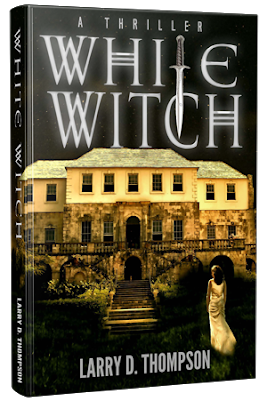

I began reading this delicious novel about voodoo and Jamaica and I couldn’t help but think of James Michener. Granted, James went much further in his historical novels, but Larry gave him a run for his money in White Witch.
We begin in 1812 Jamaica. Annie Palmer is not only a sadistic plantation owner, she is a black widow. She mates and she kills. She is an Obeah priestess, the White Witch.
I love the Caribbean. It is my favorite travel destination. To me, nothing compares to the raw beauty and power of the islands. The mix of the old and the new draws me into the mix of the tumultuous world of voodoo and bauxite mining, greed and history will be bumping heads in a big way. For some reason, lately I have been reading a lot of books that deal with mining…and it is never in a good way. Is it a current theme in the publishing and writing world? No matter, I am eager to begin.
Will is rough, tough, a o nonsense kind of guy. Right off you know better than to push him too far. He’s a decorated Seal and he’s head of security for Global American Metals. I start off not liking the guy. Can he redeem himself in my eyes? We shall see.
He’s sent to Jamaica to smooth the ruffled feathers of the Maroons, who have plenty to say about the strip mining of their tropical rain forest.
A tropical rain forest, an unhappy nation of Maroons, a curse, voodoo, and now a dead body. Let’s rock!
All the ugliness of corporate greed rears its ugly head. The only reason I am not super ticked off is because I believe the destruction of the rain forest, at least if Annie has anything to say about it, will never happen.
It takes a novel like this to make some people think about the environment, let alone a rain forest. I love when novels contain important elements of real life, making them more believable.
White Witch by Larry D Thompson is so much more than what I was expecting. The twisting and turning, the mystery and danger, the tension and suspense kept me reading into the wee hours of the morning. I love when an author can incorporate fact and fiction with a little mysticism into an adventure that makes me see an exotic tropical island in a new light. I knew some of Jamaica’s history from reading and visiting this world tropical paradise. That makes it easier to get lost in the story.
Read more

Published on April 29, 2018 00:00
April 27, 2018
From the Writer's Trenches Marilyn Horowitz

One good thing about all of the snow was that it felt great to stay inside and write. As I sat writing and watched the big white flakes fall, I marveled when I remembered that each snowflake is unique, in the same way that each of our stories is unique.
One of the principles I use when developing a new TV series or screenplay is to encourage the writer to be as specific as possible. The more specific we are, the more universal we are. By embracing your personal past, ethnicity and race, the better the work gets, and the deeper the connection with the intended audience.
I met with my friend, Ken Atchity last week. Ken is a former professor turned producer, and is rare combination of erudite erudition, streetwise savvy and kindness. He has just written a new book, Sell Your Story To Hollywood: Writer’s Pocket Guide To The Business of Show Business.
There’s a lot of meaty information, but one thing that really spoke to me was his advice to writers when waiting for a meeting, for the deal to close, or production to happen. DON’T WAIT! Do something while you wait.
Work on a new project. Every story has it’s own flow and it can take 10 minutes or ten years to set up a project. One of my colleagues just sold a project to Netflix that took ten years!
Ken quotes Ray Bradbury: “ Start writing more. It’ll get rid of those moods you’re having.”
I’m looking forward to speaking to FilmMakeHers, a dynamic group of women dedicated to furthering their careers in the business. I will be giving a talk about how to use The Four Magic Questions Of Screenwriting when structuring a film or TV pilot. I’m planning to have the attendees use the technique to either structure a new story, or review one they are currently working on during the three-hour class. It’s so exciting to work on new stories with new people!
Ask you write, consider how your personal history can successfully influence your work, and appreciate your own uniqueness.
Here's to your successful writing!
Professor Marilyn Horowitz

Published on April 27, 2018 00:00
April 25, 2018
There Are 3 Ways To Break Into Hollywood And I Didn’t Use Any Of Them by Dr. Ken Atchity
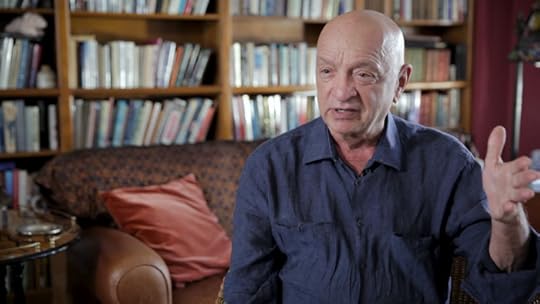
Watch the video interview on Youtube here
Film Courage: What key steps did you take to go from being a tenured professor? Most people would do many things that aren’t good to be in those shoes. I’m sure first of all you had to deal with social pressure, people were probably trying to talk you out of it…maybe not? What steps did you take?
Dr. Ken Atchity, producer/author: Well…in retrospect you can always make it look more planned and logical than what it was at the time. But I basically…I ran into a very inspiring many whose name is Norman Cousins who was the editor of Saturday Review world of those days and he came to speak in a class of mine at Occidental College and it turned out we shared a motto that no one else in the world had ever heard of and that motto was a single sentence by the Spanish philosopher [José] Ortega y Gasset that said “I think the only immoral thing is for a being not to use every instant of its existence with the utmost intensity.” And I had never heard anyone else quote that, but after his talk in my class I asked him to come to my office and I showed him that it was framed above my desk and so needless to say we bonded. Long story short, I asked him what I should do when I grow up which I’d asked male authority figures all my life basically. He told me after we got to know each other that I should consider the entertainment business because it was much broader than the academic world and people can basically do whatever…anything creative you’re encouraged to do basically. You can find your own way. There are no rules and schedules and all of those kind of things that we find in academia.
And I love academic you know? The world and the ideas that are exchanged and all of that. But it was restricting and it was (for me) suffocating. Which is a word that means a lot to me personally. It’s my most ancient nightmare being suffocated and I’ve never been suffocated in the…(Watch the video interview on Youtube here ).
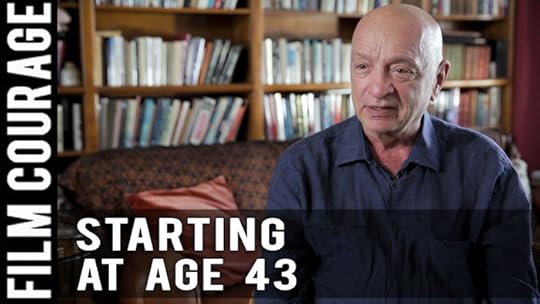
Watch the video interview on Youtube here

Published on April 25, 2018 00:00
April 24, 2018
The Meg Standee from the floor of CinemaCon!
The Meg standee will allow you to take a photo inside the mouth of a shark, which should make for a fun social media pic! So keep your eyes peeled, Meg-heads.
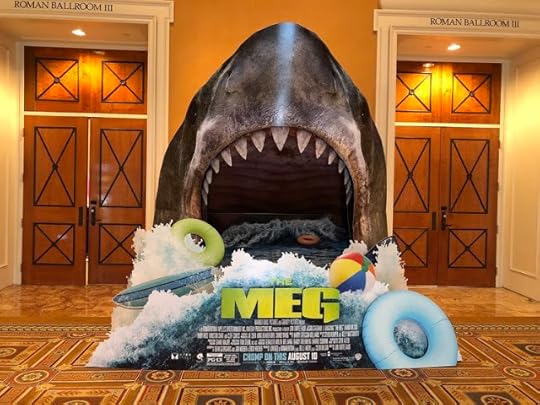



Published on April 24, 2018 04:28





